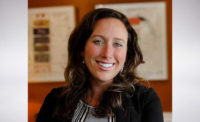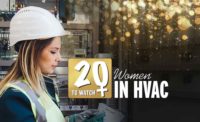Name/Title/Company: Katie Callender, client executive, IMEG Corp.
Educational Experience: Bachelor’s degree, mechanical engineering, University of Nevada
Professional Credentials/Accreditations: Registered professional engineer (P.E.) in Nevada and California
Organizational Affiliations/Achievements/Awards: ASHRAE, Northern Nevada Chapter International Code Council (NNICC), International Association of Plumbing and Mechanical Officials (IAPMO), the North Nevada Executive Council (NNEC), and PHCP Pros’ 2022 Women in Plumbing, Heating, Cooling, and Piping
What does your day-to-day job entail?
I manage IMEG’s Reno, Nevada, office, which, locally, includes mechanical, plumbing, electrical, and low-voltage consulting services. I also serve as the office’s lead mechanical engineer. I’m doing less day-to-day engineering modeling these days. Instead, my time is more frequently spent meeting with clients, pursuing new business, and ensuring our engineers and staff have what they need to get the job done on time and on budget.
What caused you to/when did you fall in love with engineering?
I was really good at math but realized the career path for math majors was limited. A friend suggested engineering, and I fell into the architecture, engineering, and construction (AEC) industry upon leaving college. It was extremely rewarding — the diverse nature of projects, ongoing technological and code advancements, and opportunities for continual challenges and learning.
What has been the most rewarding/proudest aspect of your engineering career?
I’m proud of the projects our office has the opportunity to provide services for that lift the local community. Some examples:
The Liberty Dogs campus, which will raise and train service dogs for military veterans and provide a place for the veteran to live on-site and leave with their forever dogs.
The Eddy House, a new 27-apartment complex that will give homeless, at-risk, and aged-out foster youth in the community a safe home.
A new city police headquarters converted from the former Reno Gazette-Journal building, and a new city fire station headquarters located at the old police headquarter site.
What challenges do women face in this profession? Can you give a personal example? Why aren’t there more women in engineering? How can we increase the number of women in engineering?
Women can face many adversities, such as being underestimated, experience misogyny, inequalities, etc. Even after many years in the industry, I can still be in the field and ask questions of people who respond to the male employee in the group instead of myself. It has not been my personal experience for these challenges to be significant enough to be overwhelming. The primary way to increase more women in engineering is to generate more awareness in the field. If there are any insecurities expressed by any individual, speak candidly about them and explore how those concerns can be mitigated.
How many years have you been active in the engineering sector? What’s changed the most in that time? What’s changed the least?
I’ve been an engineer for nearly 20 years. The biggest changes have been in codes, sustainability, and decarbonization. The world has moved more toward net-zero energy, and the codes are continually changing, which affects our designs. Also, there are a lot more women in the industry now. What’s changed the least? On a base level: people. We still have the same basic levels of reactions toward differing situations, with a wide range of personalities, requiring different approaches to deal with each obstacle pending the specific personality.
As the manager of IMEG’s Reno office, you wear a lot of hats. How do you keep everything straight?
Organization and extra hours, as needed. You have to stay organized. It’s a question of how much can we manage, how do we manage it, and how can I organize myself effectively to do that. I didn’t fall into this realm of responsibilities all at once — I worked up to it, so I already had many of these duties. From there, I kept adding others in and organized to allow for that. I’m very reliant on my Outlook calendar, and our office created some Excel spreadsheets to help organize projects and people.
You were heavily involved in a project that converted the former Reno Gazette-Journal building into the Reno City Police Headquarters. Tell us about this project and what made it so challenging/rewarding?
It was challenging to figure out how to make it work within the budget. This was an old building made for a different application — printing newspapers. So, we had to figure out what we could maintain, if possible, and what different equipment and systems we could consider to make it as energy efficient as possible. It’s always rewarding to help the city. To go through that challenge, come out on the other side, and find something that is buildable and capable of making people comfortable and happy was rewarding.
What drives/motivates you every day?
I enjoy what I do. I’ve always loved math and science, but I’m additionally a bit of a people person, so I like the capability to get to go out and meet different people and experience different things. I am still very involved in the different engineering challenges with our projects and have the benefit of continual learning.
What remains on your engineering bucket list — what do you aspire to do that you haven’t accomplished yet?
It would be nice to do a flagship project that’s known nationally. But I’m not the person who needs to have a building with my name on it for people to remember me by. It’s more about being a good person, doing a good job, and enjoying everyday.
What’s one thing no one knows about you?
As a child, I would have my parents continually buy math booklets as my idea of a fun pastime. Working on math problems was tantamount to working on any variety of puzzles.
List any mentors who’ve helped you succeed and describe precisely how they’ve shaped your success.
My parents have always promoted education and my capabilities to do what makes me happy as well as encouraged me to be independent. They are always there as a sounding board and happy to give their advice on any obstacle I encounter.
John Tankeh and Ben Sprinkle provided both contractor and engineering knowledge and different ways to look at things in my early engineering career. They started a strong basis on engineering practices and expectations.
Sean Frey continued to help develop my knowledge further and expanded this toward a larger array of applications and a deeper understanding of overall practices. He further supported my growth by exposing me to a greater array of resources than I was previously exposed to.
Tony Price has made a point to always be available to help with any operations, proposals, leadership, and/or business advice. He has been a great resource of understanding and knowledge for advice.
What advice do you have for prospective female engineers considering entering the field?
Be curious. This is a field that is ever evolving. Be comfortable knowing you will never know everything nor do the people around you. Don’t be afraid to ask questions. As my career has progressed, and I’ve learned a variety of approaches and systems from other engineers in different specialties/disciplines, I’ve found a way to grow and expand my skills and capabilities with each experience. Learning from all available sources, even if it does not seem to fully pertain to your specialty, can add a greater understanding to how your specialty works in the bigger picture.





